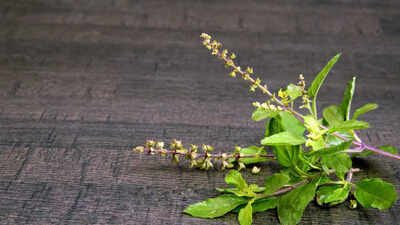ARTICLE AD BOX

Medicinal plants have been an essential part of traditional healing systems across cultures, from Ayurveda and Traditional Chinese Medicine to folk remedies passed down through generations.
In India, herbs have played a key role in home remedies and daily health care since Vedic times. Today, with rising interest in natural, sustainable wellness and the side effects of synthetic medicines, more people are turning to medicinal plants that can be easily grown at home.Creating a home garden of healing herbs doesn’t require a large space or complex tools. Many of these plants are low-maintenance, thrive in pots or small beds, and offer a range of benefits for immunity, digestion, skin care, and stress relief.
This is your go-to list of 10 popular medicinal plants you can grow at home and how they support everyday health.
10 must-have medicinal plants for your home garden
Tulsi (Holy Basil)

Tulsi is often referred to as the “Queen of Herbs” in Ayurveda. Its leaves are rich in compounds that help fight infections, reduce inflammation, and support respiratory health. Tulsi tea or raw leaves can aid in relieving colds, coughs, headaches, and digestive discomfort. The plant also supports blood sugar balance and heart health.
Ajwain (Carom Plant)

Source: Wikipedia
The ajwain plant resembles the money plant in appearance and grows well in sunlit conditions. Its leaves and seeds have antibacterial and anti-inflammatory properties. Ajwain is traditionally used to ease indigestion, bloating, and stomach cramps. Chewing a few leaves or brewing ajwain tea can help relieve gastrointestinal discomfort.
Coriander (Dhaniya)

Source: Wikipedia
Fresh coriander is not just a kitchen staple; it also has medicinal value.
The leaves are rich in vitamins A, C, and K, and essential minerals. Coriander is known to help regulate blood sugar, improve digestion, support liver function, and lower bad cholesterol. Its anti-inflammatory compounds can also benefit those with joint pain or ulcers.
Aloe Vera

Source: Wikipedia
Aloe vera is a versatile plant widely used in both skincare and internal health. The gel inside its thick leaves soothes burns, cuts, and skin irritation.
It is also used in hair care and cosmetic preparations. When consumed in moderation, aloe vera juice supports digestion, detoxification, and immune function.
Lavender

Source: Wikipedia
Though native to the Mediterranean, lavender grows well in India’s drier regions with proper sunlight and drainage. Its flowers produce a calming aroma known to reduce stress, anxiety, and insomnia. Lavender oil has antiseptic properties and is often used to treat insect bites, burns, and minor wounds.
Lavender tea also helps ease digestive issues.
Mustard

Source: Wikipedia
Mustard plants are a rich source of selenium and magnesium, which contribute to their anti-inflammatory benefits. The seeds are commonly used in cooking, but they also support metabolism and digestion. Regular use of mustard in the diet may help manage symptoms of asthma, arthritis, and high blood pressure.
Mint (Pudina)

Mint is one of the easiest medicinal plants to grow. It thrives in warm, moist soil and partial sunlight.
Known for its cooling effect, mint helps with irritable bowel syndrome (IBS), digestion, and respiratory issues. It also freshens breath and supports mental clarity. Mint leaves are commonly used in chutneys, teas, and garnishes.
Lemongrass

Source: Wikipedia
Lemongrass has strong anti-inflammatory, antimicrobial, and antioxidant properties. Traditionally used in Ayurvedic remedies for fever and digestive troubles, it’s now popular as a detox tea.
It can also help relieve cold symptoms, headaches, and menstrual cramps. Its essential oil is used in aromatherapy and skincare.
Why Grow Medicinal Plants at Home?
Growing your own medicinal plants offers numerous advantages beyond their healing uses. Here are a few reasons why cultivating a small herbal garden can be a smart and health-conscious decision:
- Accessible Natural Remedies: Having these plants on hand means quick access to natural treatments for everyday ailments; no need to visit a pharmacy for minor issues.
- Safe and Chemical-Free: Home-grown herbs are free from pesticides and additives, making them safer for regular use.
- Cost-Effective Wellness: Growing your own herbs reduces reliance on over-the-counter medications and supplements, saving money in the long run.
- Sustainable and Eco-Friendly: Cultivating plants at home supports a greener lifestyle and reduces packaging waste from store-bought products.
- Holistic Health Support: Many medicinal plants benefit both physical and emotional health, like lavender for relaxation or mint for mental clarity.
With a bit of care and regular maintenance, these ten plants can turn any balcony, terrace, or windowsill into a thriving wellness space. Whether you’re new to gardening or looking to expand your collection, these healing herbs offer a simple yet powerful way to stay healthy naturally.Also Read: 7 easy and effective home remedies to keep spiders out of your house



.png)
.png)
.png)
















 4 hours ago
5
4 hours ago
5









 English (US) ·
English (US) ·